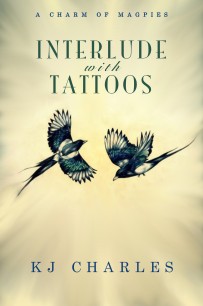So there is another free Charm of Magpies short story available right now. Another! There was one last month!
Here’s what happened. Samhain, my publisher, at that time published print a year after the electronic version. They have a minimum length at which a book can go into print, and A Case of Possession, Charm of Magpies #2, squeaked in a little under that. Now, I really wanted it in print. Because print is fun to have, but also because it’s dedicated to my friend Caroline, and she informed me that if she didn’t get a print copy to show people, I’d be in serious trouble.
I have been friends with Caro for thirty years. I know what trouble means. So I suggested to Samhain that I could write a bonus story to bring the book up to print length. They went for it, to be released electronically at the same time as the print book (hence its appearance out of series order), and even said it would have its own cover by Lou Harper. Now all I had to do was write something.
This was less easy than you might think. I was hopelessly stuck on Magpie 3 at this point, so stuck that I’d actually written an entire and totally different novel that came into my head while I was fretting (Think of England, the world’s longest example of ‘oh look, a squirrel’). So coming up with a story that fitted into a series arc that I wasn’t sure about…whimper.
I had no idea what to write.
I went for a drink with Caro and her bloke Simon, and ventured a quiet murmur of mild complaint (which I may have phrased as ‘your bloody story is doing my head in, you utter moose, now buy me a drink’). Simon asked about what I was writing. I spoke of Victorian London. And Simon, who works in the drinks trade, asked, did I know about the black cat signs they used for bootleg gin?
Tell me more, I said.
Well. It seems that the very many brewers of bathtub gin would identify their product for sale by a black cat, as a universal sign of ‘Get very cheap drink here!’, in the same way that a red and white pole indicated a barber, or three golden balls indicated a pawnbroker. I haven’t been able to find any very serious sources on this, but here’s one version as presented by Hayman’s, gin manufacturer:
Back in 1736, one Captain Dudley Bradstreet lucked into both a piece of London property and a stock of gin. Bradstreet hung a sign depicting a painted cat in the window and let it be known that doses of sweet mother’s ruin could be had at the address. “Under the cat’s paw sign was a slot and a lead pipe, which was attached to a funnel inside the house,” reads a history put together by Hayman’s. “Customers placed their money in the slot and duly received their gin. Bradstreet’s idea was soon copied all over London. People would stand outside houses, call ‘puss’ and when the voice within said ‘mew,’ they would know that they could buy bootleg gin inside. Very soon Old Tom became an affectionate nickname for gin.”
It is, at the least, a cool story. And it got me thinking. It got me thinking about what drives people to drink, to remember and to forget, about cold dark wet Victorian streets. I started thinking about what my characters had that they might want to forget. A plot came swimming out of the depths, a piece depicting one of Stephen’s justiciary cases that turns personal…
And with it came a revelation about what two of my secondary characters had been up to offstage while I was writing the main story.
I realise that this is the kind of thing that makes non-writers roll their eyes and mutter, “Obviously they aren’t doing things behind your back, they’re made up. By you.” All I can say is: Sorry, that’s how it works. I realised when I wrote this story that two characters had embarked on a relationship. That realisation isn’t pivotal to A Case of Spirits, as such…but it gave me the handle on Magpie 3 that I needed.
Suddenly I could see the shape of Magpie 3. I could see how the stories interlocked and what was driving everyone on, and what was piling strain on the main relationship. The whole book that became Flight of Magpies clicked into place. It worked. Thanks to Caroline (by accident) and to gin.
Story of my life, basically.
________________________________________________
A Case of Spirits is available from Amazon and all the usual places. It’s free (because it’s free with the print book) and comes between A Case of Possession and Flight of Magpies. It’s more a mood piece than anything, and has no series spoilers so feel free to sample if you haven’t read the others. I hope you enjoy it!
A Charm of Magpies reading order:
Interlude with Tattoos (free)
A Case of Spirits (free)
Feast of Stephen (free)
Jackdaw (coming in February, and a linked story)










 characters
characters



